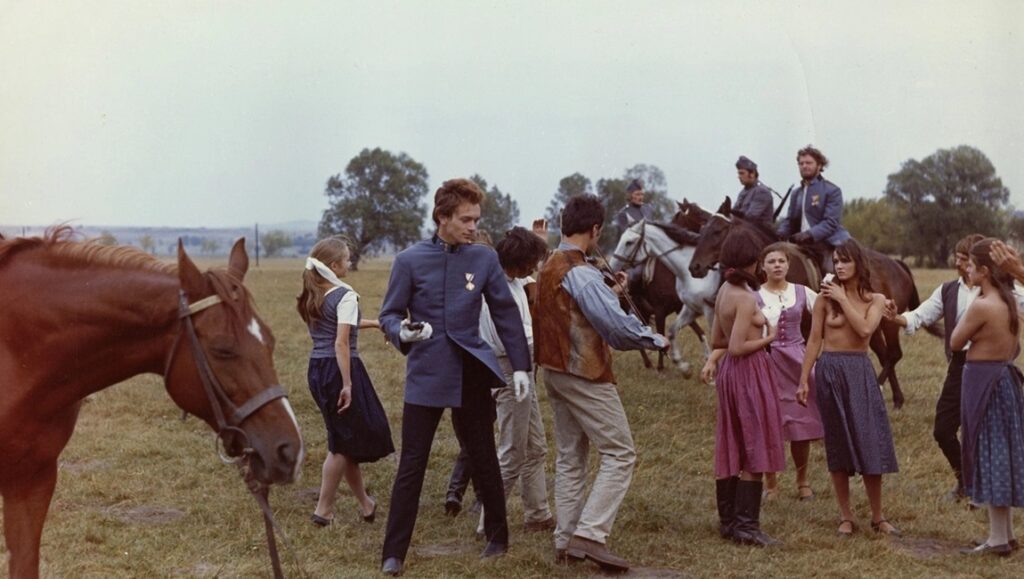By the time Miklós Jancsó made Red Psalm in 1972, he had already established his own allegorical mode of filmmaking. Stories of uprisings, movements, massacres, and changing political tides took the shape, by the late-1960s, of elaborately choreographed stage productions, populated by a cast of hundreds, where the protagonist wasn’t any individual person, but the collective. In Red Psalm the crucial introduction of singers, guitarists, violinists, and other players in the storytelling results in an anachronistic folk musical about a small peasants’ uprising in 1898.
To call Red Psalm a staged production is maybe misleading, at least in terms of viewer expectations. After all, it’s set entirely on nondescript, yellowish-green farmland whose scope and literal depth of field does not invoke the claustrophobic conditions of a stage play; but it is a stage nonetheless. Given his career-long interest in his country’s history, it might be better to refer to the flat expanses of the Hungarian countryside as Jancsó’s Monument Valley. Often, he plays with the repetitive landscape to his own benefit, using its blank surface as a stage onto which he can block the participants in Hungary’s political history.
Like John Ford, Jancsó also has a stock company. Those familiar with the roughly 10-year long stretch between 1964 and 1974 will recognize a few faces from other films, such as Josef Madaras, one of the vocal socialist peasants fighting for their rights against the capitalist government; or Lajos Balázsovits, a young officer tempted by the peasants’ collective spirit who meets his premature demise at the hands of his commander. The acting in Jancsó’s films has often been compared to the unaffected style famous in Bresson’s films, though, unlike Bresson, he worked primarily with professional actors. The flat delivery of plain dialogue, often political declarations, is always dubbed; the performances lack a sense of realism, which allows their allegorical potential to flourish; and though the actors he worked with most often are professionals, they don’t operate in the films like stars, nor are they photographed as such. Jancsó avoids revealing closeups, and his characters, by the late-1960s, and certainly in 1972’s Red Psalm, except for the faintest of traces, are largely devoid of psychology. You won’t find the Hungarian equivalent of a swaggering John Wayne or morally upright Henry Fonda here.
The real star of Jancso’s cinema, if “star” is even the appropriate term, is the company as a whole. Jancsó’s cinema depicts the direct connective tissue between political and physical movements, and as such, no single person takes precedence in either. It took some time for Jancsó to arrive at this philosophy; his 1964 drama, My Way Home, follows a Hungarian prisoner of war through a random and illogical series of movements and arrests until he ends up at the isolated outpost of a sick Russian soldier whose only duty is to milk a herd of cows for the army. Though its setting in late-WWII, Russian-occupied Hungary is no less political than Red Psalm’s, Jancsó’s approach at this early stage is much more individualist and character- (and actor-) driven.
One peculiar aspect of Jancsó’s cinema — one that, unsurprisingly, as someone who loves beauty in all its forms, informs most of my questions about his work — is his affinity for physical beauty. For a director so seemingly disinterested in the role of stardom or individuality in his most political films, why are so many of his actors so beautiful? Kozak, Balázsovits, Madaras, along with the company of women in his films, notably Andrea Drahota, all possess a beauty seemingly out of step with their films’ subject matter. Their beauty is at once remarkable and matter-of-fact, never aestheticized at the expense of the film’s political aims. Sometimes Jancsó displays their beauty crudely, flirting with objectification; and other times their beauty bears a heartbreaking tenderness, borne out of the casual but radical display of physical intimacy among men that is either unbothered by closeness or unabashedly proud of it. In a film like Red Psalm, which is all about the tenuously unified movement of a group of people, Jancsó’s attention to beauty and physical proximity, and its endurance in his signature long takes (just 26 across the film’s 82 minutes), is the greatest source of joy and despair.


Comments are closed.